The month of February will be an historic one for the National Hockey League. Next week in New York City the league’s board of governors will examine in detail the groups applying for expansion franchises when the league grows from six to twelve teams, hopefully in time for the 1967-68 season.
Four Cities Approved
The league’s expansion committee has already approved four cities as considered suitable for housing an NHL team. They are Los Angeles, San Francisco, Vancouver and St. Louis. This doesn’t necessarily mean that those four cities are locks for clubs. What it does mean is that the league believes these four communities have the population and the resources to support NHL hockey.
However in all cases, the arenas in each city will have to undergo upgrades to meet big-league standards. In Vancouver’s situation, the city will have to build a new rink to house a team. The rink the Western Hockey League Canucks play in is barely suitable for minor league shinny.
While the league has approved four cities, the identities of the team owners in those locations is still up in the air. Next week’s meeting will serve to examine in detail the prospective owners’ applications.
In addition to the four locations mentioned, the league will also add two more centres. The meeting next week is expected to go a long way in determining which two cities will join the other four.
Campbell Expects Two Franchises Next Week
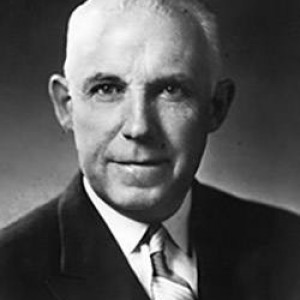
NHL president Clarence Campbell said two weeks ago that he doesn’t expect all six new franchises to be awarded at the New York meeting. He allowed that it’s likely two new owners will be named, although it is possible, though unlikely, that all six would be awarded.
Los Angeles seems to be the jewel in the list of cities anxious to join hockey’s major league. Five applicants from the west coast city are slated to make presentations to governors. Pittsburgh will have presentations from two applicants. Cities with one group applying include Buffalo, Baltimore, Philadelphia, Minneapolis-St. Paul, St. Louis, San Francisco, Cleveland and Vancouver.
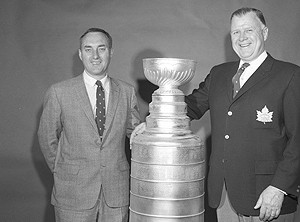
Teams will need a 75% approval from the governors to receive a franchise. That assures that no one team can veto an application.
Stafford Smythe, president of the Toronto Maple Leafs, says that as far as he is concerned, if the governors are happy with a presentation, there’s no sense waiting and a franchise may be awarded right away.
Television viewers are also important to Smythe:
“As far as I am concerned, I will favour cities that are liable to pick up an aggregate 30 or 40 million viewers for hockey.”
San Francisco Ideal Situation
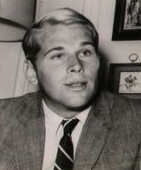
The Maple Leaf president lists San Francisco as one city that might get a team immediately. That situation clarified itself this past weekend when the Western Hockey League Seals owner Mel Swig sold his interest in the team to the Shasta Corporation and entertainer Bing Crosby. Crosby controls 51% of the ownership, with Shasta owning the remaining 49%.
Crosby will be represented at the NHL meetings by Barry Van Gerbig, a New York jet-setter. He is a financier in Manhattan.
The San Francisco group qualifies because they have necessary capital, and a new arena which will seat 16,000 is being constructed in nearby Oakland.
Buffalo Makes a Strong Push
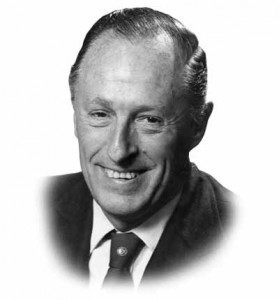
Dick Beddoes of the Toronto Globe and Mail says that the city of Buffalo is making a strong push for a team. Their group is led by the Knox brothers, who are bankers. The Knox’s strength is their net worth. They have the financial wherewithal to endure the early rough waters that all the new teams are sure to encounter.
The city of Buffalo also has plans to build a new rink that will replace the aging Memorial Auditorium. However, there are also reports that a plan is on the books to upgrade the present rink by raising the roof and adding a huge balcony that will bring capacity up to 16,000.
With Buffalo’s proximity to Toronto being just 90 miles, questions about incursion into Toronto’s territory have been raised. Smythe explained his position:
“Naturally we’d be concerned about how the televising of Buffalo games would affect us. The brochure I got from Buffalo suggested there wouldn’t be any TV conflict but this is something we would closely consider.
“The Buffalo group has convinced me that it could expand our television audience greatly. The city is 10th or 11th among television markets in the U.S. I like the people in the syndicate too. Still, they’re so close they scare me.”
Cleveland a Mystery Bid
Cleveland is a bit of a mystery contender. The city has not been one of the more prominent sites under discussion, but it is thought that Art Modell, owner of the Cleveland Browns of the National Football League, leads the group that has expressed interest.
The Cleveland Barons are long-time members of the American Hockey League and would form a natural rivalry with teams in Buffalo and Pittsburgh. The Barons applied for an NHL franchise in the 1950s but were rebuffed at that time.
Stan Musial for St. Louis?
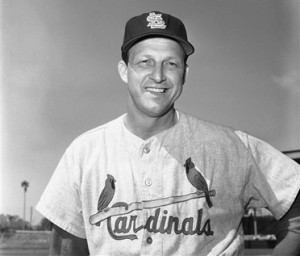
St. Louis has already been approved by the league, but the identity of possible franchisees is being kept a closely guarded secret. Whoever gets the team will have to arrange to purchase the St. Louis arena, which is owned by Jim Norris, co-owner of the Chicago Black Hawks. It’s thought that former St. Louis Cardinals baseball player Stan Musial, who is close to Norris, would be a key player in a St. Louis team.
Philadelphia Doubtful
Philadelphia is given only an outside chance at a franchise. Their applicants have neither an arena nor the land upon which to build one. Any success the City of Brotherly Love will have will depend on their ability to convince the governors that an arena will be in place by the fall of 1967.
Two Groups for Pittsburgh, but Rink Needs Work
The two groups vying for a Pittsburgh team are both said to be well-heeled. It’s thought that Senator Jack McGregor will lead one group, which includes some high-powered local business and legal people. The Pittsburgh rink is about 2,000 seats shy of what the NHL needs, and extensive renovations would be necessary for that upgrade.
Minny a Natural
Minneapolis-St.Paul is a natural location for an NHL team. It’s great hockey country, especially at the high school and college level. Whether that interest can translate to the professional game remains to be seen. The Minnesota Rangers of the Central Professional Hockey League are drawing well this season.
Governors Like Baltimore
It’s well known that the governors also favour the city of Baltimore. Their group is led by Zanvyl Krieger, chairman of the board of the Baltimore Clippers of the American Hockey League. The Baltimore Civic Centre would need major renovations to meet NHL standards. A lack of commitment on the part of the city is a stumbling block there.
Los Angeles – Jewel in the Expansion Crown?
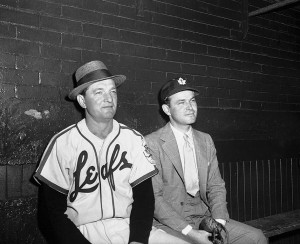
Los Angeles is drawing the most interest and has the most intrigue going into next week’s meetings. The identities of three groups were well known, while the other two up to now had been mysteries.
Jack Kent Cooke, a transplanted Canadian seems to be the favoured candidate at this early stage. He is the former owner of the Toronto Maple Leafs of the International Baseball League. He has the financial resources the governors seek, is ambitious and already owns the Los Angeles Lakers of the National Basketball Association.
Campbell isn’t sold on Cooke. He feels that his ownership of the NBA team would put him in a direct conflict with his hockey responsibilities. Campbell wants the NHL team to be the first priority for any prospective owner.
Jim Piggot and Dan Reeves are the owners of the Los Angeles Blades of the Western Hockey League and they have also applied for a Los Angeles team. Reeves has the same issue as Cooke, he also owns the Los Angeles Rams of the NFL.
The third known Los Angeles applicant is Hollywood producer Tony Owen. He is best known as the husband of actress Donna Reed, but he does have considerable financial clout.
A United States chain of television and radio stations, Metromedia, is the fourth applicant. John Kluge heads that group, which also owns the Ice Capades, a touring figure skating show.
The last group might be the most interesting. Ralph Wilson, the owner of the Buffalo Bills of the NFL is bidding for the Los Angeles franchise. He has tried to buy minor league franchises in Buffalo and Los Angeles to gain a leg up on other contenders, but was unable to make a deal in either city. Wilson is apparently leaving the Buffalo territory to the Knox family and is said to badly want a Los Angeles NHL operation. The NHL likes the fact that Wilson’s NFL interests are back east and won’t come into conflict with a California NHL team.
Vancouver: Maybe, Maybe Not
Vancouver has, up to now, been considered a lock. The city is located in Canada, but far enough away from Toronto and Vancouver to not pose a threat. It has a rich hockey history. The ownership group is well established and should have the money the NHL wants. Even hockey’s most famous broadcaster, Foster Hewitt, has a lead role with the group.
Not so fast, says Clarence Campbell. Vancouver is no sure thing:
“Many rumours have prompted the governors to question the soundness of the Vancouver group. We wonder about the depth of their financial reserves.”
Cyrus McLean, the president of the Vancouver Canucks of the WHL, bristles at such a suggestion:
“The rumours are blown out of all proportion. I pledge that a new arena seating 16,000 will be built in ample time for the 1967-68 season.”
The rumours that Campbell and McLean refer to are that McLean’s group is offering shares in the team for public sale. There were reports that the group was going to offer one-eighth shares at a price of $150,000 a share.
Smythe is opposed to that sort of ownership consortium:
That’s exactly the thing we don’t want. We don’t want any franchise carved up among a lot of people. There are too many five and ten per centers.
Smythe may have a bit of an axe to grind with a Vancouver bid. He and Harold Ballard offered to build an NHL-quality coliseum in downtown Vancouver. All he wanted was to be gifted the land upon which the rink was to be constructed. The issue was put to a public plebiscite and was rejected by Vancouver taxpayers.
Another problem with the McLean group for the governors would be any involvement by Coley Hall, the former owner of the WHL Canucks and Seals. He is not highly thought of in NHL circles and his presence would surely cause concern for the governors.
McLean says that Hall isn’t interested in getting back into the hockey business right now. Smythe disputes that notion.
The meetings next week are expected to last at least three days. History will be made, how much history remains to be seen.